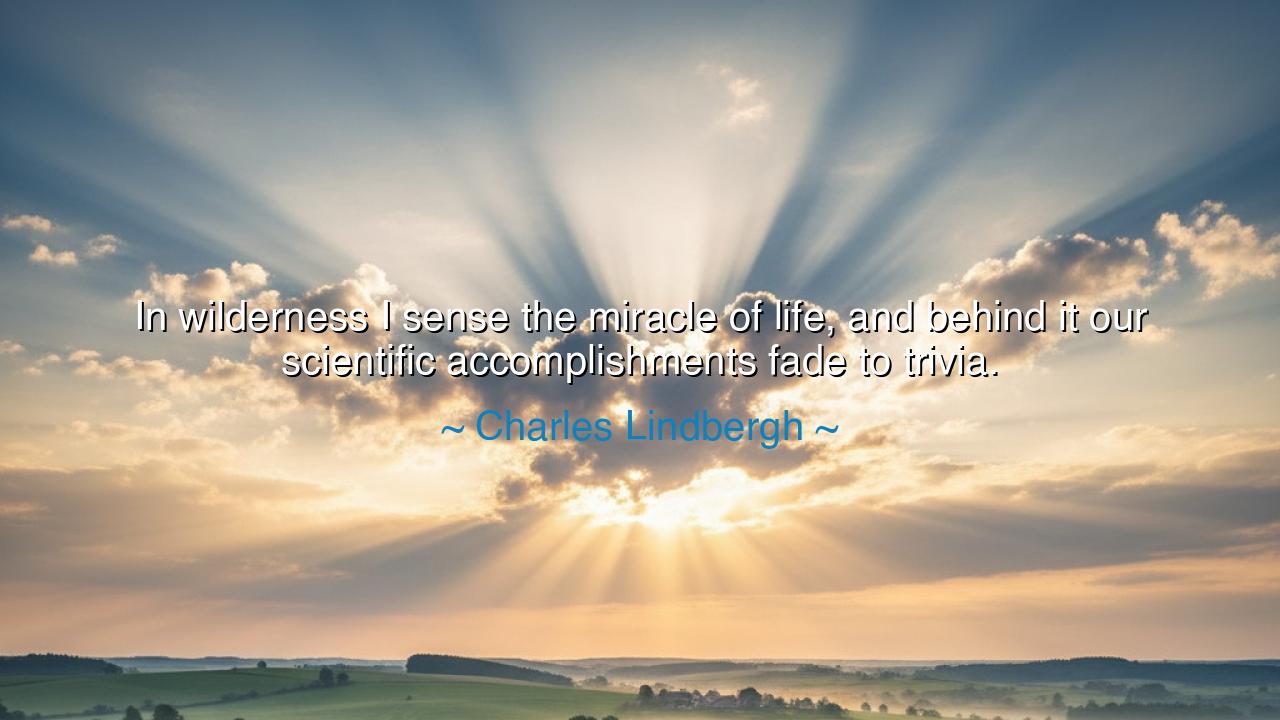
In wilderness I sense the miracle of life, and behind it our
In wilderness I sense the miracle of life, and behind it our scientific accomplishments fade to trivia.






Hearken, children of the ages, and attend to the words of Charles Lindbergh, who, though a master of flight and science, found his deepest awe in the untamed world: "In wilderness I sense the miracle of life, and behind it our scientific accomplishments fade to trivia." Here lies a meditation upon the grandeur of creation, the humility of the human spirit, and the profound realization that even our loftiest achievements are dwarfed by the sublime forces of the natural world. Lindbergh, having crossed the vast expanse of oceans by air, understood both human ingenuity and the immutable majesty of life untouched by human hands.
In these words, wilderness represents the primordial and ungoverned forces of Earth—the forests, mountains, rivers, and skies that exist beyond calculation, beyond invention, and beyond human control. The miracle of life manifests in the intricate cycles of ecosystems, the silent growth of forests, and the delicate balance of species. Lindbergh teaches that no matter the brilliance of our technology, the achievement of the human mind must bow in reverence to the enduring and independent vitality of nature.
Consider the example of John Muir, who wandered the American wilderness, capturing in his writings the sacredness of untouched lands. Muir’s devotion to wilderness conservation arose not merely from aesthetic appreciation, but from recognition that human science and invention, while powerful, are fleeting compared to the eternal rhythms and miracles of life unfolding in wild places. Lindbergh echoes this truth: the grandeur of creation is timeless, and our feats, however remarkable, are temporary and small by comparison.
Lindbergh’s words also illuminate a moral and philosophical truth: humility is the proper response to life’s miracles. Scientific accomplishments, whether the mastery of flight, the harnessing of electricity, or the decoding of the atom, are remarkable, yet they remain trivial in the face of the spontaneous beauty and complexity of living systems. Recognition of this hierarchy fosters awe, gratitude, and respect for the world beyond human control, tempering hubris with reverence.
The miracle of life in wilderness also invites contemplation and renewal of the spirit. In the silence of forests or atop mountains, one perceives the intricate symphony of existence—the interdependence of creatures, the rhythm of seasons, the flow of water, and the quiet endurance of time. This awareness awakens a humility that is both philosophical and ethical, guiding human endeavor with respect for life rather than domination over it.
Historical explorers and naturalists exemplify this balance. Alexander von Humboldt, wandering the jungles of South America, marveled at ecosystems that were beyond comprehension, noting that even the greatest human inventions could not match the ingenuity embedded in natural processes. Like Lindbergh, Humboldt recognized that the wilderness imparts lessons of scale, patience, and wonder, revealing the limitations of human accomplishment.
The lesson is profound: seek the wilderness not only as a refuge, but as a teacher. Let the grandeur of untrammeled life remind you that human inventions, while remarkable, are small compared to the enduring and intricate beauty of existence. Cultivate awe, reverence, and humility, allowing the natural world to inform both your understanding and your actions.
Practical action follows naturally: spend time in wild landscapes, observe life unfolding in forests, mountains, rivers, and skies. Reflect upon the balance, complexity, and resilience of ecosystems. Let your innovations and accomplishments be guided not by pride, but by the insight that human endeavor is enriched and tempered when it respects and harmonizes with the miracle of life that exists independent of our hand.
Thus, Charles Lindbergh’s words endure as both celebration and counsel: in the face of wilderness, the human mind is humbled, the spirit awakened, and even our greatest achievements reveal themselves as mere trivia in the vast and wondrous tapestry of life. Let every journey into the wild remind us that reverence and awe are the highest forms of wisdom.
If you wish, I can also craft a poetic, audio-ready version of this passage, where the cadence mirrors the vast, silent grandeur of wilderness and the awe it inspires, enhancing the emotional and reflective resonance of Lindbergh’s insight. Do you want me to do that?






AAdministratorAdministrator
Welcome, honored guests. Please leave a comment, we will respond soon